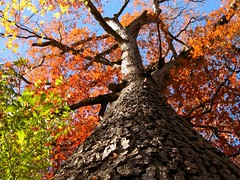Sunday morning, a dozen people joined me for CPOP's regularly scheduled 10am nature hike. We enjoyed blue skies over trails that were still muddy from last week's deluge.
Luckily, Jimmy reads the Memphis Flyer more carefully than I do, and he warned me that last week's issue said our hike would start at 11:30. Shortly after the 10 o'clock hikers dispersed at the Lick Creek bridge, about fifteen Flyer readers showed up for their 11:30 hike.
I can walk in the woods all day without getting bored, so I was happy to do back-to-back hikes. Let's do it again sometime!

Tuesday, December 30, 2008
Good Day Sunshine
Posted by Naomi Van Tol at 1:50 PM 0 comments
Labels: Hike Recap
Saturday, December 27, 2008
Here comes the sun
Everyone is welcome to join us at 10:00am tomorrow, Sunday the 28th, for a nature hike in the Old Forest! We meet at the east end of Old Forest Lane, next to the Rainbow Lake parking area.
Posted by Naomi Van Tol at 3:30 PM 0 comments
Labels: Hike Info
Friday, December 26, 2008
There's Fungus Among Us
We took a Christmas afternoon hike and enjoyed the mild weather. I got a new camera from Santa, so I snapped a few pics of some really cool mushrooms.
These first two are almost flower like...
And these remind me of a snowflake and snow...
Oh, and this one looks a little like...BRAINS!
Cool huh? Anybody know what these are called?
Posted by Stacey Greenberg at 7:25 PM 0 comments
Labels: Old Forest Wonders
Thursday, December 18, 2008
For these paths
A Blessing for the Woods
By Michael S. Glaser
Before I leave, almost without noticing,
before I cross the road and head toward
what I have intentionally postponed—
Let me stop to say a blessing for these woods:
for crows barking and squirrels scampering,
for trees and fungus and multi-colored leaves,
for the way sunlight laces with shadows
through each branch and leaf of tree,
for these paths that take me in,
for these paths that lead me out.
Posted by Naomi Van Tol at 7:22 PM 0 comments
Labels: Poesy, Why We Fight
Wednesday, December 10, 2008
Hortus siccus
Outside is cold and dreary today, but the sunshine is on its way back. Join us this Saturday, December 13, at 10:00am for our usual Second Saturday hike. As always, we meet at the Lick Creek bridge by the Rainbow Lake parking area, at the east end of Old Forest Lane.
You might think there isn't much to see in the Old Forest this time of year, but you'd be wrong. Our winter woods are chock full of huggable trees and gawkable natural wonders of all shapes and sizes.
In winter, nature is a cabinet of curiosities, full of dried specimens, in their natural order and position. The meadows and forests are a hortus siccus. The leaves and grasses stand perfectly pressed by the air without screw or gum, and the birds' nests are not hung on an artificial twig, but where they builded them.
- From "A Winter Walk" by ol' Hank Thoreau



See you in the woods!
Posted by Naomi Van Tol at 3:29 PM 0 comments
Labels: Hike Info, Old Forest Wonders
Friday, December 5, 2008
The faded earth, the heavy sky
Our winter woods are empty and quiet and dull compared to earlier seasons, but they are not silent. Nuthatches chatter, gray squirrels forage for acorns, a flock of migrating blackbirds rises in a noisy swirl.
We hear these things. We don't hear the lively chaos bustling beneath our feet. Tree roots unfurling, beetles eating fungi, earthworms converting leaf litter into thick rich soil.
Our human ears fail us, here.
Likewise, our eyes favor big things over little things. Our brains are hardwired to value rare things more than common things.
Our human senses and our human instincts tell us that majestic oaks are better than lichens. Elephants are better than lowly worms.
It's so easy to forget that without worms, there would be no elephants. Without lichens, there would be no oaks.
Oak, elephant, hickory, tiger, forest. We love the sound of these words.
Fungus, slime, mold, grub, soil? Not so much.
But without soil, there would be no forest. Without grub, there would be no tiger. Without microbe, there would be no human.
Take a walk in our winter woods and ponder on that.
Posted by Naomi Van Tol at 7:30 PM 2 comments
Labels: Old Forest Wonders, Why We Fight
Pawpaw Mystery
Who's chopping down our pawpaw trees?
Taking a few pawpaws to eat: Cool.
Taking enough to eat for a week: Eh, not so cool.
Cutting down baby pawpaw trees: Extremely uncool.
Posted by Stacey Greenberg at 9:54 AM 0 comments
Labels: understory
Thursday, December 4, 2008
Wednesday, December 3, 2008
Scars
Ok, let's play a game. Can you guess what made these scars? (Pictures by me, answers by Naomi)
A.
B.
C.
D.
Answers
A. These holes were made by woodpeckers hunting the beetles, ants, termites, and other insects that are munching away inside this dead elm.
B. The striped scars around this pawpaw were made by a twining vine that has died and fallen off the tree.
C. This old water oak is what we call a "snag" or "wildlife tree." It has been dead for a long time. Fungi and wood-boring insects have removed and softened the remaining bark. The two large holes were likely made by Pileated woodpeckers, and may be used as nesting cavities. The loose bark and cavities in the upper reaches of this tree will provide shelter and nesting sites for animals such as tree frogs, raccoons, gray squirrels, flying squirrels, several types of bats, opossums, house wrens, great horned owls, barred owls, screech owls, and a variety of woodpecker species.
D. The holes in this pawpaw sapling were made by a woodpecker called a yellow-bellied sapsucker (for real!) which, as its name suggests, feeds exclusively on tree sap. The sapsucker drills a line of holes, slurps up the sap that emerges, and repeats the process until its little yellow belly is full.
How'd you score?
4 right = You are a bonafide treehugger!
3 right = You are one step away from being a bonafide treehugger!
2 right = You should come on more CPOP hikes!
1 right = You should come on more CPOP hikes too!
0 right = Contact Naomi immediately for your punishment!
Posted by Stacey Greenberg at 7:50 AM 0 comments
Labels: Old Forest Wonders
Tuesday, December 2, 2008
Spruce Up Your Immune System
Or in our case, OAK up your immune system...
From this month's Men's Health magazine:
You may finally have a legitimate reason to hug a tree: A hike in the woods can boost your immunity, say Japanese researchers. They found that men who walked through a forest for a total of six hours over 2 days experienced a 46 percent spike in their blood levels of natural killer cells, which are part of your body's SWAT team against invading viruses. Apparently, all trees release airborne chemicals called phytoncides that not only protect their foliage from microbes, but also help stimulate our own immune systems.
Presumably this works for the womenfolk too.
Posted by Stacey Greenberg at 9:20 AM 2 comments
Labels: Old Forest Wonders

























